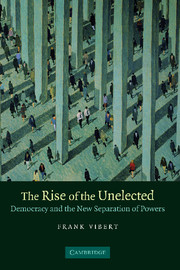Book contents
- Frontmatter
- Contents
- List of boxes, tables and figures
- Acknowledgements
- Introduction
- 1 The world of the unelected
- 2 The driving forces
- 3 The advantages of the new separation of powers
- 4 The challenge to conventional democratic theory
- 5 Adapting traditional approaches
- 6 The new separation of powers and the advent of the informed citizen
- 7 Informed citizens and the changing role of traditional institutions
- 8 The legitimacy of the new branch
- 9 The new separation of powers and the European Union
- 10 International institutions: blurring the boundaries
- 11 Conclusions: the accountability of the new branch
- Appendix: List of unelected bodies referred to in the text
- Bibliography
- Index
4 - The challenge to conventional democratic theory
Published online by Cambridge University Press: 22 September 2009
- Frontmatter
- Contents
- List of boxes, tables and figures
- Acknowledgements
- Introduction
- 1 The world of the unelected
- 2 The driving forces
- 3 The advantages of the new separation of powers
- 4 The challenge to conventional democratic theory
- 5 Adapting traditional approaches
- 6 The new separation of powers and the advent of the informed citizen
- 7 Informed citizens and the changing role of traditional institutions
- 8 The legitimacy of the new branch
- 9 The new separation of powers and the European Union
- 10 International institutions: blurring the boundaries
- 11 Conclusions: the accountability of the new branch
- Appendix: List of unelected bodies referred to in the text
- Bibliography
- Index
Summary
At first sight the development of a new form of separation of powers within democratic structures of government would not appear to offer any great challenge to democratic theory and practice. The development is taking place within a democratic context and for reasons that are about improving the quality of information, knowledge and judgements within democratic societies. The people themselves are the ultimate beneficiaries. Yet the new separation of powers does indeed challenge conventional ways of looking at democracy and is giving rise to new adaptations to traditional accounts of democracy. This chapter examines why conventional accounts of democracy are challenged by the growth in importance of the unelected bodies. For this purpose it looks at three currently fashionable accounts of democracy – participatory democracy, democracy expressed as the rule of law and deliberative democracy. None can deal with the rise of the unelected.
The erosion of participatory democracy
The rise of the unelected is a challenge first of all to theories of democracy that stress the fundamental importance of participation in politics. Widespread and compelling evidence of disinterest and disinvolvement in established democratic politics has re-established the relevance of the tradition in democratic thought that stresses the importance of participation in government by the people. People power has had some striking successes in recent years – from the former East Germany to Georgia, the Ukraine and to the Lebanon. Participation is clearly valued when democracy is new.
Information
- Type
- Chapter
- Information
- The Rise of the UnelectedDemocracy and the New Separation of Powers, pp. 55 - 68Publisher: Cambridge University PressPrint publication year: 2007
